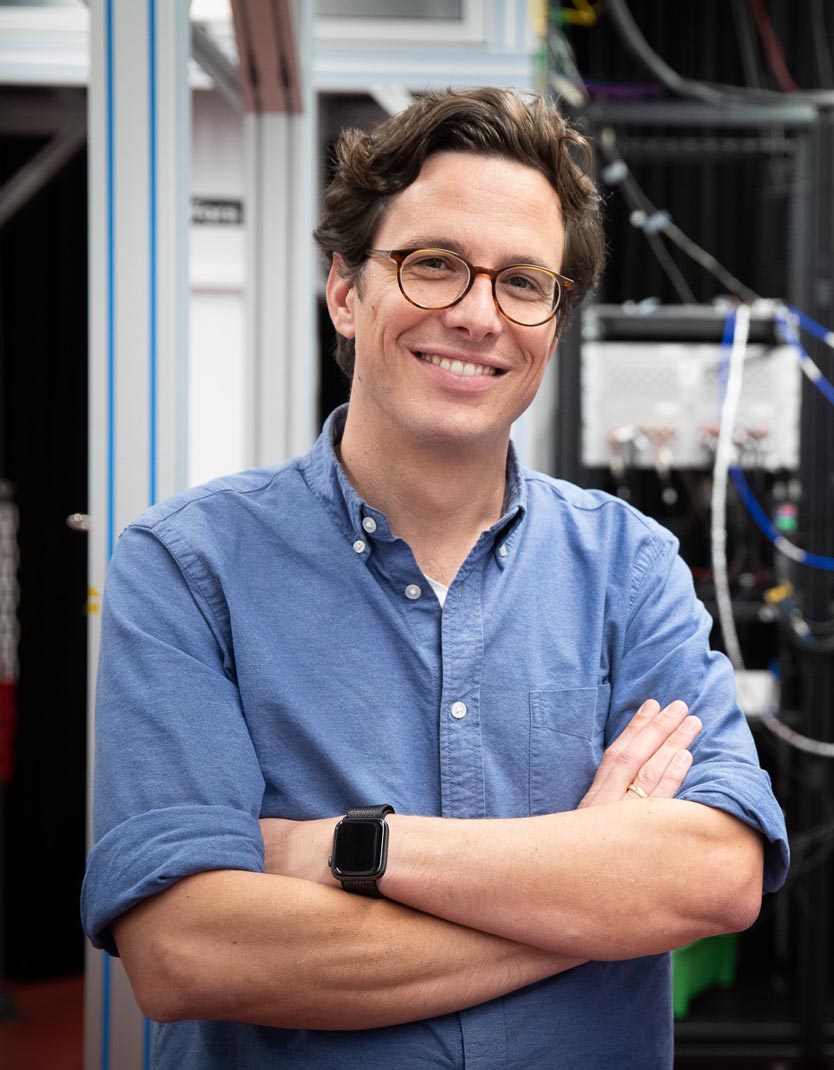April 9, 2020
Boosting large-scale quantum computing networks
Superconducting quantum circuits — a new pathway towards large-scale quantum computers. Future and Emerging Technology (FET) grant awarded to IST Austria quantum physicist, Johannes Fink.

Professor Johannes Fink, quantum physicist from the Institute of Science and Technology Austria (IST Austria), has been awarded a third Future and Emerging Technologies (FET) grant as part of the EU Horizon 2020 project, ‘SuperQuLAN’. The FET program targets groundbreaking research likely to contribute to emerging technologies such as quantum computing. Professor Fink — together with an international consortium of leading scientific experts and industry partners headed by Professor Peter Rabl from TU Wien — will investigate the applicability of using superconducting quantum circuits to produce large-scale quantum computing processors and networks.
Today’s chip-based quantum computers need to operate in small, confined, highly insulated and supercooled chambers for their qubits (the quantum equivalent of a transistor) to compute reliably. The current inability for such quantum computers to be interconnected is one of the key challenges towards the realization of larger-scale quantum applications. Now, IST Austria Professor Johannes Fink— together with an international consortium of leading scientists and industry partners— propose that this limitation can be overcome by developing quantum circuits that may, in the future, be able to interface multiple quantum processors to establish quantum data centers and networks known as QuLANs (Quantum Local Area Networks). This is the third FET grant Fink has received for his ongoing research into quantum-integrated devices.
“At present, superconducting qubits are operated in dilution refrigerators that provide a cold, dark and noise-free environment for the microchip circuits. This is a significant limitation for scaling up quantum processors required to implement error correction, and to realize secure and distributed quantum networks. The targeted breakthrough of this project is to overcome this limitation by connecting multiple dilution refrigerators to establish local area networks (LANs), a goal that could be achieved via cryogenic transmission lines, or optical fiber at room temperature”, says Fink. “Such a modular approach based on connecting multiple intermediate scale quantum processors has many practical advantages and could help advance large scale quantum computing significantly.”
The consortium’s project, entitled ‘SuperQuLAN’, is coordinated by Professor Peter Rabl from the Technical University of Vienna (TU Wien). It brings together leading experts from the Spanish National Research Council, ETH Zurich, Max Planck Institute of Quantum Optics, IST Austria and is taking place in close collaboration with the industry partner Zurich Instruments. The project aims to achieve a working QuLAN through two main approaches: a cryogenic transmission line between quantum computers and by converting the quantum information into an optical signal via a specialized interface, which Fink describes as “the quantum equivalent of an ethernet card or a quantum optical modem.”
Fink adds: “Finding new ways to interconnect quantum circuits brings us one step closer to realizing large-scale quantum devices that might unlock unbreakable privacy in communication, quantum cloud computing and unprecedented sensing capabilities, which in turn have the potential to spur on new scientific breakthroughs and advances.”
Link to the SuperQuLAN website
About the Future and Emerging Technology (FET) grant scheme
Part of the European Horizon 2020 research and innovation program, the Future and Emerging Technology (FET) program is a grant scheme that targets visionary projects with the potential to initiate new lines of technology through advanced and multi-disciplinary collaborations. The program promotes excellent basic science research and facilitates international collaborations to focus efforts on solving ambitious scientific and technological challenges ranging from quantum simulation to bio-electronics.
About the Fink Group at IST Austria
Professor Johannes Fink leads a research group at IST Austria that is positioned between quantum optics and mesoscopic condensed matter physics. The group studies quantum effects in electrical, mechanical, and optical chip-based devices with the goal to advance and integrate quantum technology for simulation, communication, metrology, and sensing. More information can be found here.
The group’s role within the ‘SuperQuLAN’ project is to develop a high bandwidth electro-optic interface that is able to translate the quantum information stored in a superconducting quantum computer into quantum information encoded in near infrared light fields suitable for existing fiber optic networks.



